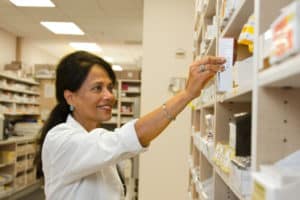You’re standing before a career crossroad, and the pharmacy signpost is giving you pause. After all, these are the times of lightning-fast changes in healthcare and a job market that’s as steady as a house of cards.
Peel away the layers of hearsay and let’s examine the solid tablets of truth about pharmacy as a career choice in the USA—because you deserve to make an informed decision about your future.
Quick Takeaways:
- Pharmacy offers a stable and financially rewarding career, with evolving job roles that extend beyond traditional dispensing duties into clinical settings and public health initiatives.
- While pharmacy education involves considerable investment and the profession can be stressful, strategic career planning and self-care can lead to satisfactory work-life balance.
- For those seeking diversity in their pharmacy career, opportunities exist in clinical pharmacy, academia, informatics, and roles within the pharmaceutical industry like Medical Science Liaison.
Is Becoming a Pharmacist Really Worth It?
When thinking about pulling the trigger on a pharmacy degree, it’s smart to weigh the pros and cons. On one hand, the cost of education can be hefty, with Doctor of Pharmacy (Pharm.D.) programs often leaving students in a significant amount of debt. But let’s put things into perspective, pharmacists can command a pretty penny once they’ve got those hard-earned credentials. According to the Bureau of Labor Statistics, the median pay for pharmacists in 2021 was around $128,000 a year. Not too shabby, right?
Now, it’s not just about the paycheck; job stability plays a big part. Historically, healthcare jobs have been pretty secure, but the landscape is always changing. On a positive note, people are always going to need medications and someone knowledgeable to dispense them, so in that sense, pharmacists remain in the mix. The key is to consider the long-term payoff versus the upfront investment. Sure, the initial cost can be daunting, but the return—financially and in terms of job satisfaction—can be substantial.
Job stability? Check. Potential earnings? Check. But remember, becoming a pharmacist isn’t just about the money. It’s about the passion for the field, the desire to help others, and the dedication to stick with a rigorous education path.
What’s the Current Job Market Like for Pharmacists?
Zooming in on the job market, things can get a bit tricky. There’s been talk about the market becoming saturated, especially in urban areas where competition is fierce and jobs can be harder to snag. Still, don’t let this dampen your spirits if city life is what you’re after—opportunities still abound for those willing to hustle and stand out from the crowd.
On the flip side, if you’re open to packing up and heading to rural areas, you might just hit the jackpot. Many rural communities are in dire need of healthcare professionals, including pharmacists. This not only potentially offers a higher demand for your skills but also a chance to make a significant impact on underserved populations.
So, what’s going on inside the field? Pharmacists today are doing a lot more than counting pills. The role is evolving with pharmacists taking on more clinical responsibilities, administering vaccines, and playing a key part in public health. These expanding roles could mean more diverse job opportunities and a chance to carve out a niche for yourself.
The bottom line: keep your finger on the pulse of the market, network like it’s your job (because it sort of is), and be flexible with potential locations and roles. Check out resources like the American Society of Health-System Pharmacists (ASHP) for insights into the market trends and tips on landing a job.
How Stressful Is a Pharmacist’s Life?
Let’s face it, the life of a pharmacist can be as hectic as a coffee shop during the morning rush. Workload can be intense, with a relentless stream of prescriptions to fill, phone calls to manage, and a parade of customers with questions about their medications. And with healthcare becoming more complex, the pressure is mounting to stay up-to-date with the latest medical information and technology.
Then there’s the matter of customer interactions. Like any public-facing job, you’ll meet all sorts—some as sweet as pie, others… well, not so much. Having a thick skin and the patience of a saint comes in handy, especially when faced with the umpteenth question about why a prescription isn’t ready yet.
Of course, there’s also a sizable chunk of administrative responsibilities to juggle—from managing inventory to dealing with insurance claims. It’s a balancing act that requires top-notch organizational skills and attention to detail.
And let’s not forget the importance of avoiding errors – the stakes are incredibly high. One small mistake can have serious consequences, so the stress of maintaining impeccable accuracy is a constant companion in a pharmacist’s day-to-day life.
Is it tough? Absolutely. But for many pharmacists, there’s a certain satisfaction that comes from the hustle, from knowing they’re essential cogs in the healthcare machine, and from the gratitude they earn helping people live healthier lives. Plus, many pharmacists find ways to manage stress effectively through teamwork, setting professional boundaries, and self-care strategies. Always remember, in any health-focused career, taking care of yourself is just as crucial as taking care of your patients.
There are resources dedicated to pharmacist well-being, such as the American Pharmacists Association (APhA) and various state associations, which offer support for those in the field. If you love being in a dynamic environment and are keen on making a difference, the stress can certainly be worth the reward.
Stay tuned, as we continue to delve into the reality of a pharmacy career in the USA. Whether it’s assessing the potential for advancement or exploring the flexibility offered by the profession, we’ll give you the straight talk on what to expect and how to thrive in this ever-evolving field.
What Are the Pros and Cons of a Career in Pharmacy?
The field of pharmacy brings with it a mixed bag of advantages and challenges that can make or break your enthusiasm for the career. Let’s break down the good, the bad, and everything in between.
Pros:
- Job Security: One thing’s for sure – pharmacists are always in demand. With an aging population and the ever-present need for medication management, you can count on pharmacy to offer job stability.
- Competitive Salary: Your bank account will likely thank you for becoming a pharmacist. Salaries in this field are nothing to scoff at, offering financial stability for you and your family.
- Meaningful Impact: You’re not just doling out pills; you’re providing a service that can profoundly affect someone’s health and wellbeing. The opportunity to educate and help patients is both rewarding and fulfilling.
- Intellectual Stimulation: If you’ve got a love for lifelong learning, pharmacy will keep you on your toes. There’s always a new drug on the market or a fresh piece of research to digest.
Cons:
- Educational Investment: Becoming a pharmacist means committing to years of schooling – and let’s not forget the accompanying student loans.
- Work Pressure: The pressure of ensuring accurate and safe dispensing of medications can be a heavy weight on your shoulders, leading to stress and potential burnout.
- Lack of Advancement: For some, the upward mobility in pharmacy can feel limited, potentially leading to job dissatisfaction as the years roll on.
- Retail Woes: If you’re in a retail setting, expect the hustle and bustle of long hours, weekend shifts, and the occasional difficult customer.
Remember, while the grass might seem greener in another profession, every career path will have its weeds. It’s about sifting through to find what you value most.
Can You Have Work-Life Balance as a Pharmacist?
Finding harmony between your professional obligations and personal life can feel like searching for a unicorn – mythical and elusive. However, with a little finesse, pharmacists can indeed craft a satisfying work-life balance.
Here’s what you need to consider:
Set Boundaries: Establish clear lines between work and home life. When your shift is over, take a deep breath and switch off ‘Pharmacist Mode.’ This can help manage stress and prevent bring work home with you.
Flexibility: Fortunately, not all pharmacy jobs are created equal when it comes to hours. Seek out employers that offer part-time work, flexible hours, or even job-sharing opportunities, so you can be there for those important life moments.
Prioritize Self-Care: Remember to put on your oxygen mask first. Take advantage of your days off, using them to recharge and indulge in activities that bring you joy or relaxation.
Consider the Setting: Some pharmacy settings, such as hospitals or clinics, might offer more predictable schedules compared to retail pharmacies which could call for late nights and weekend shifts. Keep this in mind when job hunting.
With intention and a bit of strategic career planning, work-life balance isn’t just a pipe dream. It’s doable and, frankly, necessary for a long and satisfying career.
What Are Alternative Careers for Pharmacists Outside Retail?
Who says you have to stick with retail? Choosing to become a pharmacist doesn’t mean you’re resigned to a lifetime behind a drugstore counter. Explore your horizons with these options:
Clinical Pharmacy: Dive into patient care in a hospital or clinical setting. Here, you can collaborate with healthcare professionals to optimize medication therapy for patients.
Pharmaceutical Industry Roles: Swap patient interactions for test tubes and clinical trials. Opportunities abound in drug development, marketing, regulatory affairs, and quality control.
Academia and Research: If you’ve got a knack for research and teaching, why not mold young minds? Educate the next generation of pharmacists or engage in groundbreaking pharmaceutical research.
Informatics: The field of pharmacy informatics is an exciting frontier. Work at the intersection of medication and technology to improve healthcare delivery systems.
And here’s the golden nugget most blog posts won’t tell you:
Medical Science Liaison (MSL): If you’re charismatic and have a solid understanding of therapeutics, consider becoming an MSL. Serving as a crucial link between pharmaceutical companies and healthcare professionals, this role allows you to flex your science muscles while building relationships in the industry. With a PharmD under your belt, you’ll be a hot commodity for pharma companies looking to bolster their clinical expert squads.
Remember, branching out can lead to a fulfilling and potentially less stressful career path. With a pharmacy degree, you’ve got a treasure trove of options – it’s just a matter of picking the right door.






